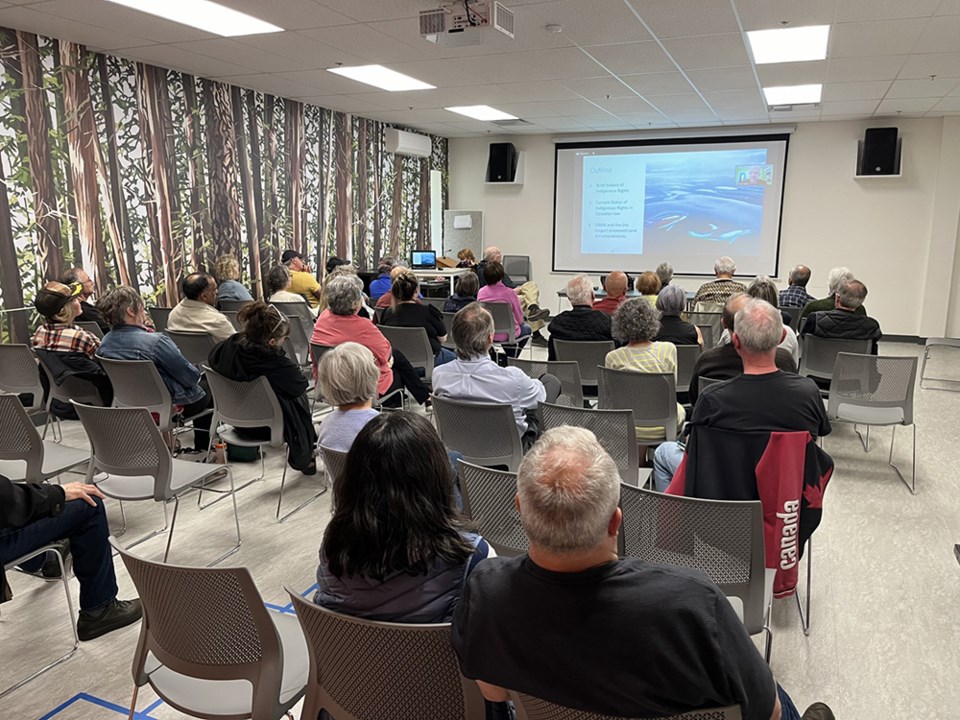In a public education event on May 7, sponsored by the education committee of Westview Ratepayers Society, West Coast Environmental Law staff lawyer Andrew Gage outlined amendments to the provincial Land Act and the Declaration on the Rights of Indigenous Peoples (DRIPA).
Gage appeared virtually before an assembly of about 40 people at Powell River Public Library. In an interview with the Peak afterward, he said he was giving some historical context that gives rise to why the provincial legislation is important.
“When Britain declared its sovereignty over what is now British Columbia, it failed to follow the basic legal requirements under British law to assert sovereignty,” said Gage. “The point is that from the very beginning, BC has been set up for a messy legal situation.”
Gage said the declaration of sovereignty does not remove legal institutions or land rights or other legal structures that existed before the introduction of sovereignty.
“There’s been literally decades of litigation that have over time established clearly that the Canadian courts recognize that aboriginal title exists over significant areas of the province,” said Gage. “For the most part, we don’t yet know where those are, creating this situation of huge uncertainty for businesses, for the First Nations themselves, and for everyone.”
Gage said the United Nations Declaration on the Rights of Indigenous Peoples (UNDRIP) has been described as bare minimum best practices for protecting the legal rights of First Nations, and DRIPA was passed unanimously in the BC legislature. He said the Land Act amendments that were proposed were intended to enable the government, where appropriate, to enter into agreements that would describe how joint decisions were going to be made regarding public land as a way of promoting reconciliation. He added that the provincial government rushed through consultations without a lot of fanfare and there was a very quick turnaround.
“I’m not defending the particular aspects of how the consultation was done, but it is very clear what the government was trying to achieve,” said Gage.
He said that during his presentation to the ratepayers, he was trying to put the proposed Land Act amendments into the proper context.
“We have a choice,” said Gage. “We can either continue to litigate these questions, and eventually the courts will begin to delineate exactly where aboriginal title exists and where it doesn’t, and what the obligation of governments are. It’s an expensive, divisive, inflexible way of doing things. It’s not in anyone’s interest to spend decades in court, trying to get answers to those questions.
“What DRIPA does and what the United Nations declaration does is provide a roadmap to where we want to get to in terms of reconciliation and respectful relationships with one another. I don’t view the outcome as being that different from where Canadian courts are headed. The difference is that it is a much more collaborative, flexible approach to getting there.”
Gage said the Land Act amendments are currently in a state of limbo, having been withdrawn by the government in February.
“They [the government] have said they hope to bring it back at some point when they have time for more comprehensive consultations,” said Gage.
Decision making
According to a West Coast Environmental Law blog post from February 20, co-authored by Gage, the Land Act amendments would allow the province to enter into agreements together with Indigenous governments to share decision making on the use of public land. The post states that joint decision making does not necessarily mean that one party has the unilateral power to block a final decision.
Westview Ratepayers Association president Rick Craig said, speaking for himself, there were important issues related to the educational session that the association sponsored.
“We wanted him [Gage] to come because we wanted people to understand what the perspective of the current government and people who support DRIPA is, because what he presented very effectively was the reasons why they want to do this,” said Craig. “We think this is probably going to be one of the biggest issues of this decade. It has the potential to change everything as the province moves forward.
“People need to know about it so our first intent was to make sure we let people know that it is happening. Mr. Gage was willing to do that and we’re happy that he did.”
Craig said at the same time, the ratepayers’ perspective is that there are a lot of concerns, so Gage was sent those concerns and asked to address them.
“There are implications and they are substantial,” added Craig. “People need to know that and they need to know the responses to that.
“From my own perspective, he [Gage] was a very effective speaker, and he gave a good history of why this is happening, but the concerns raised are very serious and there is going to need to be more discussion around them. The consequences going forward are very major for everybody.”
Craig said the Westview ratepayers are not going to take a position, pro or con, but the organization is going to help people understand the pro and the con.
“It’s being done in secret and we think that is wrong,” he added. “We think everything should be transparent and that people should get all the information. There is a massive need for broader communication.”
Craig said the Land Act has serious implications and the ratepayers are working to help people understand what is involved.
Join the Peak's email list for the top headlines right in your inbox Monday to Friday.


